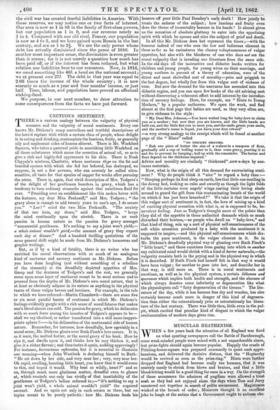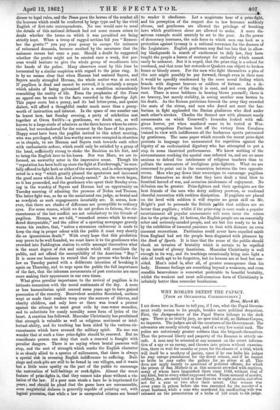MUSCULAR HEATHENISM.
EN a few years back the attention of all England was fixed on what sporting newspapers call the Battle of Farnborough, some weak-minded people were seized with a not unpardonable alarm, lest prize-fights should again become popular. Happily the oracle of Printing-house-square was prepared summarily to quiet such appre- hensions, and delivered the decisive dictum, that the " Heptarchy would be revived as soon as the prize-ring." Hints were further dropped that" England had become really too humane, that it was scarcely manly to shrink from blows and bruises, and that a little blood-letting would be a good thing for once in a way. On the strength of these assurances the admirers of pugilism were allowed a treat such as they had not enjoyed since the days when Tom and Jerry sauntered out together in search of polite amusement. Magistrates winked at the breach of order ; Ministers thought it an excellent joke to laugh at the notion that a Government ought to enforce obe-
dience to legal rides, and the Times gave the heroes of the combat all the honours which could be conferred by large type and by the vivid English of first-rate correspondents. No one would care to recal the details of this national debauch had not some reason arisen to doubt whether the terms on which it was permitted are being strictly kept. When a troop of ragged urchins bid you "Remem- ber the grotto !" you pay your penny to escape the nuisance of reiterated demands, because soothed by the assurance that the nuisance recurs but once a year. Should a doubt be suggested whether the grotto might not be erected once a week, few per- sons would hesitate to give the whole group of mendicants into the hands of the police. Many observers must by this time be tormented by a similar suspicion with regard to the prize ring. It is by no means clear that when Heenan had maimed Sayers, and Sayers nearly strangled Heenan, the whole matter was at an end. If pugilism is dead and cannot be revived, it is certainly a corpse which admits of being galvanized into a condition miraculously resembling the reality of life. From the prophecies of the Times an appeal can be made to the facts recorded in the Sporting L. This paper costs but a penny, and its bad letter-press, and quaint dialect, will afford a thoughtful reader much more than a penny- worth of instruction and interest. In the space of one number can be learnt how, last Sunday evening, a party of celebrities met together at Owen Swift's—a gentleman, we doubt not, as well known to a large circle of admirers as the three heroes whom he enter- tained, but overshadowed for the moment by the fame of his guests. Happy must have been the pugilist invited to this select meeting, who was privileged, whilst less worthy men were occupied in churches or in chapels, to see Heenan and Sayers rush towards each other with enthusiastic ardour, which could only be satisfied by a grasp of the hand, sufficiently strong to shake the Beuician on his feet, and to bring the English hero to his knees. Nor was Mace, we are in- formed, an unworthy actor in the impressive scene. Though his "reputation has been built up since the fight at Farnborough," he man- fully offered to fight both or either of the warriors, and in other respects acted in a way " which greatly pleased the spectators and increased the good name which Jem had already earned." As the week began, so it has proceeded, and the gentlemen who spent their Sunday even- ing in the worship of Sayers and Heenan had an opportunity on Tuesday morning of admiring the prowess of Nolan and Thomas. The latter fight was, as far as the uninitiated can judge, as brutal and as rowdyish as such engagements invariably are. It seems, how- ever, that there are shades of difference not perceptible to ordinary eyes. For some reason, which we do not profess to fathom, the cir- cumstances of the last conflict are not satisfactory to the friends of pugilism. Heenan, we are told, "remarked scenes which he consi- dered disreputable," and the editor of a sporting newspaper gravely warns his readers, that, " unless a strenuous endeavour is made to keep the ring in proper odour with the public it must very shortly die an ignominious death." With every hope that this prediction may prove to be well founded, we must leave it to the gentlemen who crowded into Paddington station to settle amongst themselves what is the exact degree of riot and misrule which will conciliate the public, and not offend the susceptibility of the American " Boy." It is more our business to record that the persons who broke the law on Tuesday parted with a deliberate intention of breaking it again on Thursday, and to urge upon the public the full importance of the fact, that the inhuman amusements of past centuries are once more making their appearance in our own times.
What gives peculiar importance to the revival of pugilism is its intimate connexion with the moral sentiments of the day. A more or less humanitarian spirit seemed some years ago to have gained possession of the country. Benevolent societies flourished, authors wept or made their readers weep over the sorrows of thieves, and charity children, and only here or there was heard a protest against the attempt to meet great evils by rose-water remedies, and to substitute for manly morality some form of lyrics of the heart. A reaction has followed. Muscular Christianity has proclaimed that strength is valuable as well as religious sentiment or intel- lectual ability, and its teaching has been aided by the various cir- cumstances which have aroused the military spirit. No one can wonder that at such a time prize-fights should be, renewed. But no considerate person can deny that such a renewal is fraught with peculiar dangers. There is no saying where brutal passions will stop, and the sort of strength which marks the English character is so closely allied to a species of callousness, that there is always a special risk in arousing English indifference to suffering. Bull- rings and cock-pits are still to be found in our villages, and it wants but a little more apathy on the part of the public to encourage the restoration of bull-baitings or cock-fights. Almost the worst feature of prize-fights is, that they cannot take place without a vio- lation of the law. If a poor man steals a hare he is imprisoned for years; and should he plead that the game laws are unreasonable, even magisterial dulness is generally capable of pointing out, with logical precision, that while a law is unrepealed citizens are bound to render it obedience. Let a magistrate hear of a prize-fight, and his perception of the respect due to law becomes suddenly obtuse, and gentlemen are allowed the privilege of breaking laws which gentlemen alone are allowed to make. A more dis- astrous example could scarcely be set to the poor. As the power of democracy increases, the sole force to which men can look as a protection against tyranny is a national reverence for the decrees of the Legislature. English gentlemen may find too late that in allow- ing blackguards in search of excitement to defy law, they have taught the people a lesson of contempt for authority which cannot easily be unlearnt. But it is urged, that the prize ring is a school for manhood, and that none but cowards or Quakers can object to broken bones or bloody noses. For the men who fight themselves a plea of this sort might possibly be put forward, though even in their case it would be speedily condemned by the same moral feeling which brands with disgrace bravoes or soldiers of fortune. As a de- fence for the patrons of the ring it is cant, and not even plausible cant. There is some boldness in bearing blows yourself ; there is no bravery, but merely stolidity, in seeing another man beaten to his death. As the Roman patricians forsook the army they crowded the seats of the circus, and men who dared not meet the bar- barians in fight applauded the Dacian gladiators who died under each other's strokes. Charles the Second saw with pleasure manly amusements on which Cromwell's Ironsides looked with reli- gious horror, yet when manhood came to be tested at Wor- cester, scrupulous Puritans bore off the victory from Cavaliers trained to view with indifference all the barbarous sports patronized by gentlemen. The same paper which records the recent prize-fight protests in language too unmeasured for repetition against the bigotry of an ecclesiastical dignitary who has attempted to put a stop to some theatrical performances. We know nothing of the circumstances marking the special case referred to, and are no more anxious to defend the intolerance of religious teachers than to palliate the encounters of irreligious prize-fighters. What we are concerned to point out is the connexion between the two opposite errors. Men who pay down their sovereigns to encourage pugilism flatter themselves no doubt that they have dealt a fatal blow to fanatical hatred of war, and sectarian intolerance of enjoyment. No delusion can be greater. Prize-fighters and their apologists are the best friends of the men who decry military prowess, or confound cheerful recreation with reckless dissipation. If pugilists are placed on the level with soldiers it will require no great skill on Mr. Bright's part to persuade the British p4tblic that soldiers are no better than pugilists ; whilst if the prize-ring is once made a popular entertainment all popular amusements will soon incur the odium due to the prize-ring. At bottom, the English people are an essentially sober and seriously-minded people, and are but too ready to be led by the exhibition of immoral pastimes to look with distaste on even innocent recreations. Puritanism could never have expelled mirth from England had not the people been disgusted with pleasure by. the Book of Sports. It is time that the sense of the public should check an invasion of brutality which is certain to be repelled by an inroad of gloomy fanaticism. Muscular Christianity is well enough in its way, and its teachings occasionally bring into light a side of truth apt to be forgotten, but its lessons are at best but one- sided. Man's mind is, after all, of greater consequence than his body. Humane feelings are something beyond a weakness, and even maudlin benevolence is somewhat preferable to boastful brutality, whilst the weakest and most self-conscious form of Christianity is infinitely better than muscular heathenism.































 Previous page
Previous page